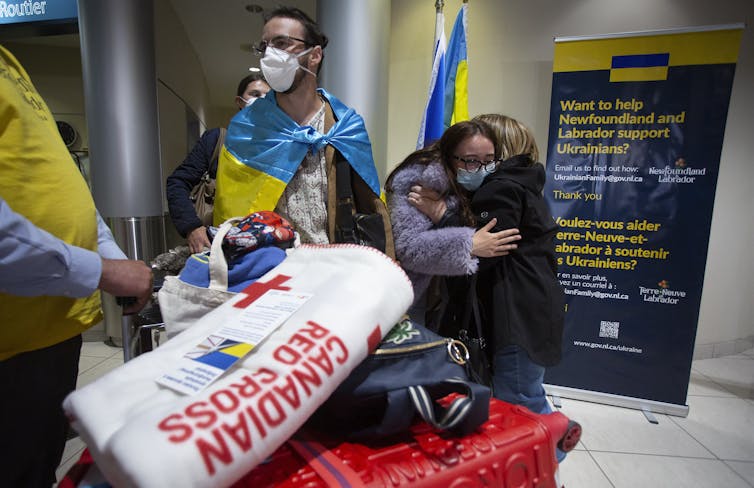
The United Nations High Commissioner for Refugees’ Global Trends Report recently announced that as of the end of 2021, 89.3 million people worldwide have been forcibly displaced. While Ukraine’s neighbouring countries originally opened their arms to people fleeing the war, they’ve since begun decreasing benefits for Ukrainians as their cities become overwhelmed.
Meanwhile, Canada is continuing its efforts to build an “air bridge” for an “unlimited number” of Ukrainians, supporting them through a one-time $3,000 payment. This is seen by some as a beacon of hope, and by others as unsustainable.
Despite Ukrainians having the need to travel to find safety, and being called refugees elsewhere, in Canada they do not arrive as resettled refugees. Instead, the federal government created a program — Canada-Ukraine authorization for emergency travel (CUAET) — that fast tracks temporary immigration for Ukrainians.
Recent public polling data from the Angus Reid Institute shows that Canadians’ support Ukrainian newcomers, in addition to supporting newcomers from Syria and Afghanistan. As migration scholars, we argue that this continued support is evidence that Canadian refugee policy, and newly developed programs like the CUAET — which leads with the head and the heart — work.
Human rights, economic growth and humanitarian impulse
The UN Refugee Convention and Canada’s Immigration and Refugee Protection Act frame a rights-based approach to refugee protection. Leading with its head, Canada has a legal obligation to promote and protect the right to asylum, and the principle of non-discrimination.
No matter their country of origin or immigration status, a person on Canadian territory has that rights are protected by the Canadian Charter.
Canada’s immigration policy aspires to be evidence-based. Research shows immigrants and refugees drive economic growth and contribute to the Canadian economy in a myriad of ways. There are good legal and economic reasons for protection.
And leading with its heart, Canada’s refugee policy and newcomer programs are framed by a humanitarian impulse. Canadian officials regularly refer to a “welcome” and “safe harbour” for the “most vulnerable” and “those in need.”
Humans helping humans
Images of human suffering — from Phan Thị Kim Phúc also known as “the napalm girl” to Alan Kurdi — have galvanized public support for refugees.
A key component in Canada’s resettlement response has been the Private Sponsorship of Refugees program. Private Sponsorship of Refugees connects human beings with human beings, fostering empathy and generating long waiting lists as Canadians step in to help.
But public support for refugees isn’t limited to sponsors.
An Angus Reid Institute survey conducted on May 18, 2022, asked about Canadians’ acceptance of newcomers from Afghanistan, Syria and Ukraine, as those have been the latest arrivals of newcomers in Canada. (This survey is not publicly available.)
The survey found that 35 per cent and 31 per cent of Canadians support accepting more refugees from Afghanistan and Syria, respectively. And 56 per cent of Canadians think Canada should accept more Ukrainians — only 14 per cent think we should accept less.
Mirroring public opinion, there is strong cross-party support for Ukrainian newcomers. In an unusual display of unity, most opposition members of Parliament pushed for Canada to waive visa requirements for Ukrainians in March.

The emotional and political reaction to different global situations has resulted in differential treatment for people fleeing violence. While Canada reduced red tape to welcome an “unlimited number” of Ukrainians, including through direct airlifts, Afghans face uncertainty, long delays and a 40,000-person cap.
To ensure a more equitable, rights-based approach, the Canadian government should draw on lessons learned from decades of refugee policy, practice and programs.
Canada should leverage and scale up existing mechanisms for resettlement, including private sponsorship. The government should process existing applications quickly and open up new spaces, respecting the principle of additionality — the idea that new spaces should not displace people who are already waiting to be processed.
Some visa requirements, including the need for biometrics, should be waived in emergency situations for all nationalities.
Echoing the recent recommendations by the House of Commons Special Committee on Afghanistan, Canada should establish an emergency mechanism to act in a timely and equitable way to all situations of displacement, not only those that garner media and political attention.
Canada has a history of being a welcoming country to newcomers. Canadians are upholding that legacy by supporting the acceptance of more. Despite this, we need a more equitable, rights-based approach so we can continue to lead with the head and the heart.
The authors do not work for, consult, own shares in or receive funding from any company or organisation that would benefit from this article, and have disclosed no relevant affiliations beyond their academic appointment.
This article was originally published on The Conversation. Read the original article.







